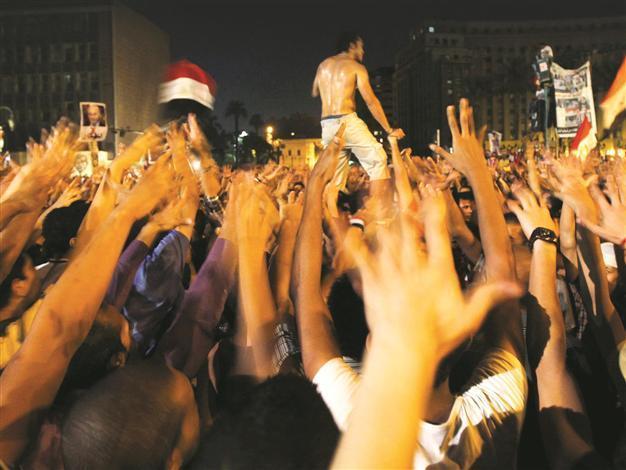Egyptian ultras emerge as powerful political force
James M. Dorsey Hürriyet Daily News

In this file photo from June 5; 2012,
Egyptian football fans protest against the
verdict for deposed leader Hosni
Mubarak. Egyptian ultras continue
to be an increasingly influent
civil group in the country. REUTERS photo
Egypt’s militant football fans, one of the country’s largest civic groups, have emerged from a week of street agitation politically strengthened as they seek to chart a course in the post-Mubarak era.
The highly politicized, well-organized and street battle-hardened fans led by supporters of Cairo giants al-Ahly SC have garnered public support from several political parties, including the Freedom and Justice Party (FJP) of newly elected President Mohamed Morsi for their agenda that calls for justice for 74 fans killed in a politically loaded brawl in February, a reform of the police and security forces, taking responsibility for security in stadiums away from the Interior Ministry, an end to corruption in football and the removal of Egyptian Football Association (EFA) and club officials with ties to the regime of ousted president Hosni Mubarak.
Expressions of support for the ultras led by Ultras Ahlawy, the al-Ahly supporters, came at the end of a week in which the fans stormed the club’s training ground to protest against the willingness of players and managers to resume football after it was suspended for seven months in the wake of the Port Said brawl without justice for the victims having been achieved. The fans stormed the EFA headquarters a day later and threatened to force their way into a stadium in Alexandria where al-Ahly was playing on Sept. 9 Egypt’s first domestic match since February.
The ultras withdrew their threat hours before the match, saying they wished to avoid bloodshed. In a statement on their Facebook page that has more than 570,000 followers, the group asserted that “the Interior Ministry has returned to its ‘dirty’ practices by playing Egyptians off against each other.” The ultras said they had recordings of a phone call in which an Interior Ministry official allegedly sought to instigate residents in areas near the Alexandria stadium to resist the ultras. The ultras charged that the ministry had planned to bring in Bedouins to confront the ultras. Security forces had put a cordon around the stadium to prevent the ultras from reaching al-Ahly’s Super Cup match against ENPPI that was played behind closed doors.
The government last weekend further bought time to avoid renewed clashes with the ultras, who are both hated and respected by security forces whom they regularly confronted in stadiums during Mubarak’s four last years in office, by postponing the resumption of the Premier League by yet another month. The league, which was suspended like all other football, was scheduled to restart on Sept. 17 despite fan opposition.
‘Just cause’ The ultras’ political battle received a boost last weekend when Morsi’s FJP, the political party of the Muslim Brotherhood, declared its “full support” for the ultras and their “just cause,” saying, “None of those who killed their colleagues have been punished.”
In separate remarks on Twitter, Khairat El-Shater, viewed as the power behind Morsi’s throne, also came out in favor of the ultras.
“Allowing the Super Cup match in the name of preserving the stature of the state is a manipulation of a righteous cause. Preserving the stature of the state will be achieved when the real perpetrators of the Port Said massacre are brought to justice,” said El-Shater, who withdrew his candidacy for president in favor of Morsi after a court earlier this year barred him from running. The Brotherhood leader further demanded that the editor of the FJP’s newspaper apologize for recently describing the ultras as troublemakers.
Tahrir Doctors, an informal grouping of physicians devoted to treating injured protesters, said in a statement that “we stress the need to take into consideration the feelings of the ultras youth. We are witnesses that the ultras’ role in the revolution was crucial, and they sought no interests or individual gains. We insist that the ultras did not originally adopt violence, and the proof of this is that they patiently demanded the state to take retribution against the Port Said killers,” the group said. Several youth groups, as well as the Egyptian Current party, issued similar statements.
A slow-moving trial against 74 people, including nine security officials, on charges of responsibility for the deaths of the 74 al-Ahly fans, has fueled ultras’ opposition to a resumption of professional football. The anger was further piqued by the Interior Ministry’s insistence that once football resumed, all matches were to be played behind closed doors.
The political backing for the ultras is in sharp contrast to their waning popularity toward the end of last year after they fought street battles against the security forces on Cairo’s Mohammed Mahmoud Street near Tahrir Square. The Port Said incident, however, earned the ultras an outpouring of empathy that has since been reinforced by the government’s reluctance to hold senior officials accountable for the deaths and its failure to reform the 800,000-strong police and security forces.
The ultras’ public support and political backing has revived debate about their political future.
Empowered by their success on the street and an awareness of the power of numbers has renewed discussion about possibly forming a political party. That may prove easier said than done. The ultras agree on their most immediate demands but hail from all walks of life and are unlikely to find ideological common ground, which is why some ultras participated this week in demonstrations in front of the U.S. Embassy in Cairo to denounce an American fringe video that, in their view, defamed the Prophet Muhammad. Nonetheless, the debate reflects the wider discussion in revolutionary circles about how to manage the transition from street to parliamentary politics in a post-autocratic society.
